SUMMARY
This is AI generated summarization, which may have errors. For context, always refer to the full article.

MANILA, Philippines – The head of an international organization that assists countries faced with oil spills reiterated on Tuesday, April 25, its commitment to compensate victims of the disaster caused by the sinking of the oil tanker MT Princess Empress.
In a meeting in the Department of Justice (DOJ) with the interagency task force on the Mindoro oil spill, Gaute Sivertsen, director of the International Oil Pollution Compensation Funds (IOPC), said the process for claiming insurance for the oil spill is already underway, and the coverage includes the expenses of the government in the cleanup.
“Right now, we are collecting claims forms from the victims, to be assessed by the experts, concentrating on fisherfolk and those who are most in need, and then we will offer settlements as soon as possible,” he said.
Justice Undersecretary Raul Vasquez said the IOPC director’s visit shows the organization’s “commitment to settle all claims” since it is the body mandated to help members that suffer from oil spills.
Sivertsen visited oil-spill-affected areas in Antique on Sunday where he personally saw the impact of the oil spill in the Western Visayas.

Vasquez said Sivertsen would bring the results of his fact-finding investigation to the IOPC based in London.
The insurance claims forms that are being filled out and collected in Oriental Mindoro and other affected areas will also be assessed by IOPC’s claims division. Valid claims will then be processed for payment of compensation due to economic losses.
Ana Cuesta, a staff of the IOPC claims department, joined Sivertsen in his fact-finding mission.
Those qualified for compensation include all persons and entities that have suffered economic losses from the oil spill. These include the fisherfolk, tourism establishments, and even government agencies that are spending money for the cleanup.
Vasquez said it was “comforting” to see the IOPC and the shipowner’s insurers and for “committing to help.”
“That saves us the trouble of going after them (shipowner),” he added, referring to RDC Reield Marine Services, owner of the sunken oil tanker. However, he said the government was still in the process of building up its case against the shipowner and other parties responsible for the oil spill, and would still file complaints against them.
The Philippines became a member of the IOPC after it ratified two international conventions: the International Convention on Civil Liability Convention for Oil Pollution Damage or CLC, and the 1992 International Convention on the Establishment of an International Fund for Compensation for Oil Pollution Damage or 1992 Fund.
The Philippines signed both the CLC and the 1992 Fund convention on July 7, 1997, and it entered into force a year later. These conventions have been incorporated in the Oil Pollution Compensation Act of 2007, which was passed a year after the Guimaras oil spill in 2006. This law puts the liability for oil spill mainly on the shipowner.
The IOPC provides additional funds for members in the event the civil liability insurance of the shipowner is not enough to pay for the oil pollution damage. IOPC Funds are financed by contributions paid by entities – mainly by companies engaged in oil trading and shipping – in member states that receive certain types of oil by sea transport
As of April 24, the total damage to the country’s agriculture and fisheries has reached P3.8 billion, with over 24,000 fisherfolk affected by fishing bans and damaged fishing grounds, according to the National Disaster Risk Reduction and Management Council. A total of 40,897 families or nearly 200,000 persons in three regions – Mimaropa, Calabarzon, and in Western Visayas – have been affected by the oil spill.
MT Princess Empress left the private port SL Harbor Terminal early morning on February 28 with 800,000 liters of industrial fuel oil or IFO. It had engine trouble, encountered strong winds and rough seas and sank off Naujan, Oriental Mindoro later that day. It spilled most of the black oil it was carrying in the succeeding days, prompting fishing and diving bans in large parts of the province. – Rappler.com
Add a comment
How does this make you feel?
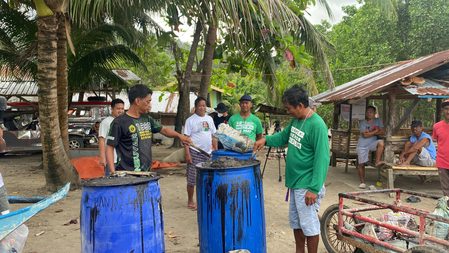











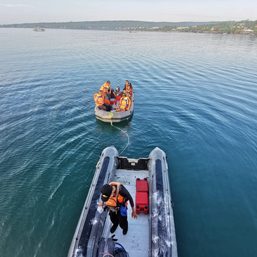
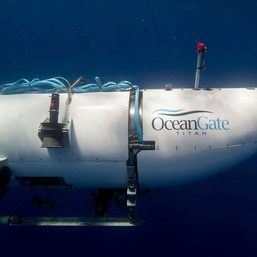
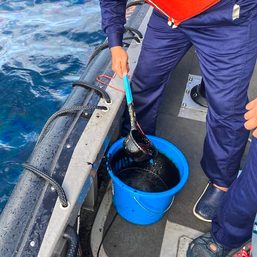






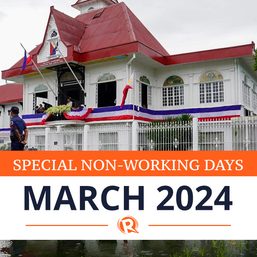
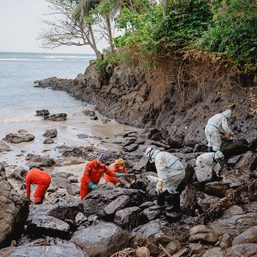





There are no comments yet. Add your comment to start the conversation.